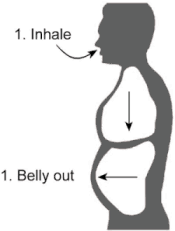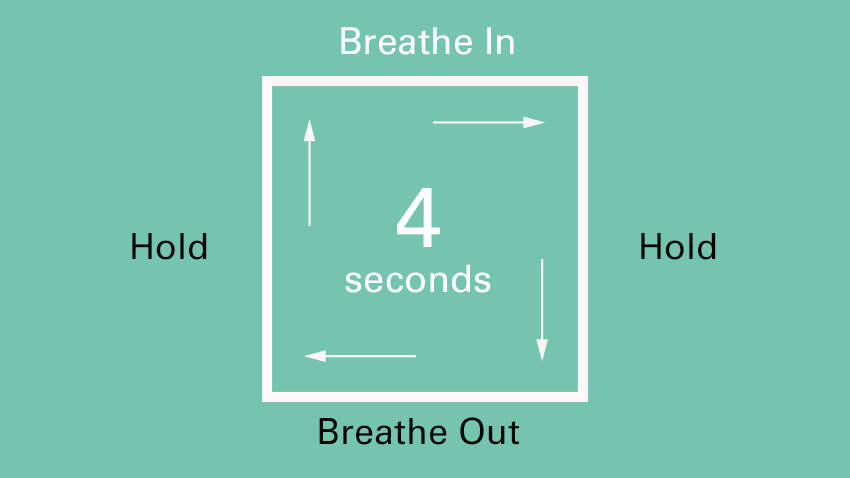Do you wake up exhausted or often get tired in the afternoon? It’s actually quite normal to feel this way. There’s a biological cause for the “afternoon slump” many of us experience.
Missing breakfast, eating a carb-heavy lunch, daily hormonal fluctuations, and our circadian rhythm all contribute to this daily period of fatigue. So does the way we breathe.
No matter the cause, this dip in energy can cause huge challenges when you need to be productive at work, check things off of your to-do list, or look after your kids.
Most of us will try anything to get the energy boost we need, from a cup or two of coffee to slamming energy drinks.

Before you reach for another cup of coffee to get you through that afternoon slump, pause and breathe. Seriously. Certain breathing exercises can boost your energy in a flash.
Breathing and Energy Levels
Before we dive into specific breathing exercises that increase energy, it’s helpful to understand the basics behind how your respiratory system operates.
When you inhale, your diaphragm contracts to make room for the lungs to expand. The muscles between your ribs contract, pulling the ribcage up and out.
Air is sucked in through the nose or mouth, traveling down the airway and into the lungs. As this happens, the lungs expand.

After the lungs move through your bronchial tubes, they reach air sacs called alveoli. From here, oxygen moves into the bloodstream as carbon dioxide leaves the bloodstream and exits the body as you breathe out.
If you’re not breathing optimally, your body won’t operate in tip-top shape. As a result, you’ll feel fatigued, unmotivated, and may even experience increased brain fog.
Proper exchange of carbon dioxide and oxygen, however, causes the opposite to occur.
A recent study shows this in action. Patients suffering from Chronic Fatigue Syndrome (CFS) had an irregular breathing rhythm. However, breathing exercises helped them to improve their condition by correcting their oxygen levels to optimal levels.
Something as simple as exhaling for a longer duration than your inhale can take the body from fight or flight to a state of relaxation and even decrease depression.
This all ties back to the nose.
Nasal Breathing is Key
When you breathe through the mouth, you’re over-breathing and placing your body in a panicked state of fight-or-flight.
This raises stress hormones like cortisol, heart rate, and blood pressure and throws off your oxygenation rate.
Nasal breathing, however, boosts energy levels by returning the balance of carbon dioxide and oxygen to its proper state. Nasal breathing has also been shown to:
- Increase mental alertness
- Activate the parasympathetic nervous system, helping us relax
- Lower stress levels
- Improve problem-solving skills and concentration
- Boost the immune system
- Increase productivity
- Filter out germs and bacteria from the air we breathe
- Decrease the risk of cavities and gingivitis
@somnifix #NoseBreathing is important. But why? 🫁 #learnontiktok #airwayhealth #asthma #healthyliving via @Medicine Explained
♬ Eleanor Rigby - Cody Fry
Now that you know how nasal breathing affects energy levels and overall health, let’s go over some simple, easy breathing exercises you can do from anywhere to boost your energy in a pinch.
1. Bellows Breath
One of the best breathing exercises for energy is “Bellows Breath,” also known as “Bhastrika.” This is traditionally used in yoga to boost your “life force” and clear the mind.
This breathing exercise is also thought to help boost your metabolism by activating the digestive system. Next time you need a jolt of energy, perform Bellows Breath. Here’s how:
- Sit up in a relaxed position and take a few deep breaths in and out of your nose. As you inhale, expand your stomach fully with each breath.
- Exhale forcefully through the nose, followed by a forceful inhale. The “bellows” breaths should be quick, at the rate of one second per cycle.
- Keep your neck, shoulders, and chest still as the belly moves in and out to ensure that the breath comes from the diaphragm.
- After 10 rounds, return to your natural breathing pattern. After 30 seconds, move to the second cycle. Try to push for 20 breaths instead of 10 if you can.
- Repeat for a final, third cycle, and push for 30 breaths if you feel comfortable doing so.

Although this is a safe breathing technique, it may lead to lightheadedness or slight discomfort. Stay sitting and pause for a few minutes until the discomfort passes until you can work your way up to the full breathing exercise.
2. 5-3-3 Breathing
5-3-3 breathing is a fairly convenient breathing exercise for energy due to the simple nature of the technique.
- Begin by taking five deep breaths. Breathe in through the nose and out through the mouth with the intention of completely filling and emptying your lungs of air.
- Breathe in and out three times in a “fast” manner, inhaling through the nose and pushing the breath out as you exhale through the mouth.
- From here, inhale and exhale three times as loudly as you can. Again, inhale through the nose while releasing the sound as you breathe out through the mouth.
- Complete at least two rounds. You can complete this exercise seated, standing, or laying down, making it perfect for any activity you may need some extra energy for.

3. Five Finger Breathing
Much like 5-3-3 breathing, Five Finger breathing can be used anywhere, anytime to increase energy.
- Begin by bringing your hands in front of you.
- Place the index finger of your right hand on the outside of your left pinky finger.
- While you breathe in, trace the bottom of your pinky finger up to the tip. Then, trace down the inside of your pinky as you breathe out.
- Repeat this with every finger. Once you reach your thumb, reverse it and work your way back to your pinky.

4. Box Breathing
Box breathing is such an effective breathing exercise for energy that even Navy SEALs are known for using it. It’s also easy to remember: each step lasts for the same count.
- Begin by inhaling through the nose and into the stomach for a count of four seconds.
- Hold your breath for four seconds.
- Exhale through the nose for four seconds.
- Hold your breath for four seconds.
- Repeat this “box” for up to four rounds.
- As you get more comfortable, you can increase the count up to five or six seconds for each step.

5. Alternate Nostril Breathing
Alternate nostril breathing is not only a wonderful breathing exercise for energy; it may also help with mild cases of congestion. This, in turn, can improve nasal breathing.
- Begin seated and rest your left palm on your knee or thigh.
- Take a few breaths in and out of the nose.
- Use the thumb of your right hand to close the right nostril and inhale through the opposite nostril.
- With your ring finger, close the left nostril and hold for one second.
- Remove your thumb from the right nostril and exhale. Then, inhale through the right nostril.
- Hold both nostrils closed for one second again.
- Take your ring finger off of the left nostril and exhale.
- Repeat this cycle up to ten times, circling the breath through the nostrils as stated above.

Boost Energy While You Sleep With Mouth Tape
We’ve gone over the best breathing exercises to boost energy during the day, but what about when you sleep? Improper breathing during sleep causes snoring, decreased energy, brain fog, and can even lead to sleep disorders.
Mouth tape helps you nasal breathe into the night without any added effort. It keeps the lips sealed, preventing mouth breathing and encouraging nasal breathing.
As a result, you’ll wake up refreshed, renewed, and full of energy after a quality night’s sleep. Now, you’re probably wondering, “Will Scotch tape work?”
Chemicals found in most tape adhesives aren’t meant for the skin and can be irritating and damaging. Our strips, however, were created with your sensitive skin in mind.

They’re latex-free, gluten-free, and hypoallergenic. Our strips also feature a gel-like adhesive that’s so comfortable you’ll forget you’re even wearing mouth tape!
Begin nasal breathing your way to more energy with SomniFix Mouth Strips tonight!



